Marco Silva: Sacking of Everton boss a blow to Farhad Moshiri's credibility
- Published
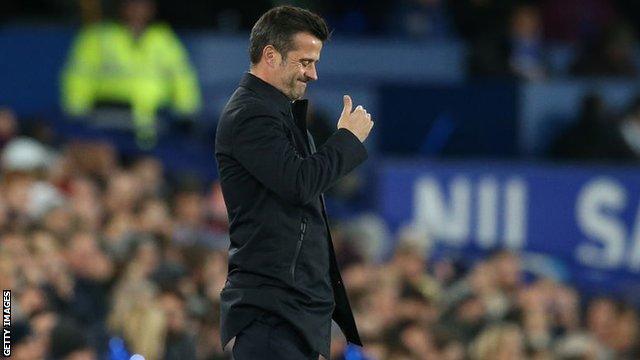
Marco Silva was appointed Everton manager in 2018 following Sam Allardyce's short term in charge
Everton's decision to sack manager Marco Silva will not only be the catalyst for further turbulence at Goodison Park - it represents a heavy blow to the personal credibility of billionaire owner Farhad Moshiri.
The club's majority shareholder made Silva a personal pet project, starting with an acrimonious pursuit of the 42-year-old Portuguese when he was at Watford after the Toffees dismissed Ronald Koeman in October 2017.
Moshiri eventually got his man in June the following year after an expensive six-month dalliance with Sam Allardyce but Silva is now his fourth managerial casualty since arriving at Everton in February 2016.
Everton's 5-2 thrashing in Wednesday's Merseyside derby at Anfield was the final straw - so why has it all turned sour?
Silva fails to live up to hype
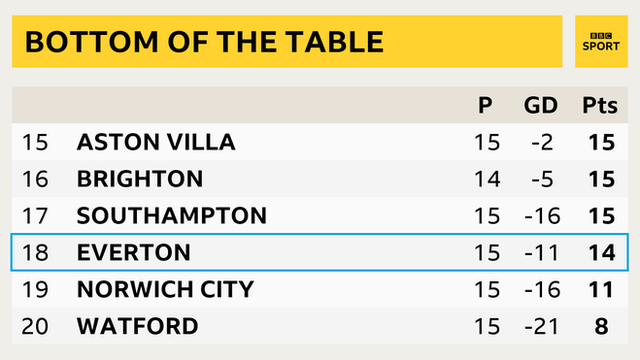
Everton have their fewest points after 15 games since 2003-04, when they finished 17th (Table correct before Thursday's Premier League matches)
Many, even inside Goodison Park, were bemused by what appeared to be Moshiri's fixation with appointing Silva in succession to Koeman.
He was regarded by many as a success at Hull City despite taking them down into the Championship, winning eight of his 22 games but not one away from home.
Silva quickly left for Watford but, after a good start there, appeared distracted by Everton's advances and was sacked in January 2018 after winning only one of his last 11 league games - with the Hornets pointing the finger of blame firmly in the direction of Goodison Park.
Moshiri, misguidedly and mistakenly as we can now see, saw Silva as a Jose Mourinho-lite. Young, driven, intense and with a desire to bring attractive, winning football to Everton.
Silva's occasional high spots, such as home wins against Chelsea, Arsenal and Manchester United at the back end of last season when Everton finished eighth, were welcomed after the joyless Allardyce months, but were the exception rather than the rule.
The Toffees' performances lacked passion, faults such as conceding goals from set-pieces went unaddressed and, most damning of all, Silva's team lacked heart and stomach for a fight.
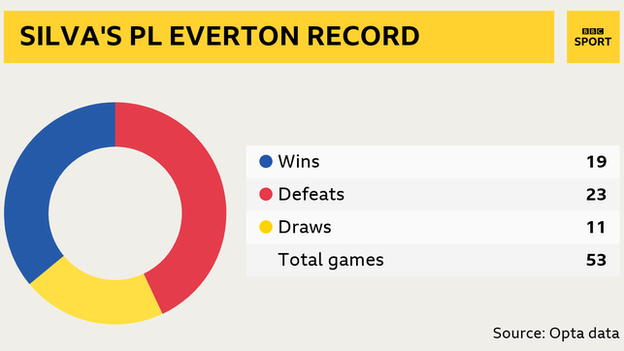
Marco Silva has lost more Premier League matches than he has won at Everton
Silva has won 19 of 53 Premier League games - in that time they have gone behind 28 times and never fought back to win. Not one comeback from behind since his first game in August 2018. It drives at a lack of inspiration from the manager and lack of fight from the team.
He also failed to organise - a familiar fault. Since he arrived at Everton they have conceded 24 goals from set-pieces - the highest, most damning figure in the top flight.
Silva has failed to integrate 19-year-old Moise Kean, signed for £27m amid great fanfare from Juventus, although the youngster has not helped himself by being late for team meetings on two occasions, the second of which prompted his exclusion from the squad at Southampton.
Everton were handed a relatively kind opening fixture list, yet were uninspired and insipid, losing to all three newly promoted teams, including Sheffield United and Norwich City at home, the latter provoking a fierce, toxic reaction.
Silva's quiet, understated personality also meant he struggled to make a connection with Everton's fans. While no-one can be something they are not, he cut a sharp contrast to the animated, and successful, Jurgen Klopp at Liverpool.
What next for Moshiri's project?
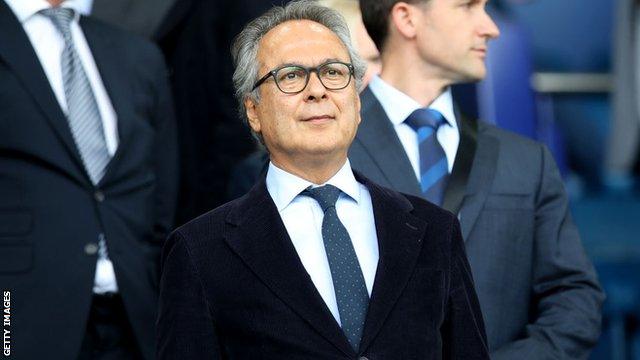
Everton shareholder Farhad Moshiri sacked former manager Ronald Koeman nine games into his second season
No-one can doubt Moshiri's ambition, given he has sanctioned around £450m of spending and laid out plans for a new stadium at Bramley Moore Dock, but his big decisions have a very poor success rate.
Moshiri wants Everton to join the A-list in the north-west alongside Liverpool, Manchester City and Manchester United - what he calls "the Hollywood of football".
Instead, they are turning into a badly scripted soap opera, making painful viewing for their fans.
The first big decisions - to sack Roberto Martinez and hire Koeman - were welcomed, only for Moshiri to fatally compromise the new set-up by appointing Leicester City's title talent-spotter Steve Walsh as director of football, a role for which he was ill-suited, and revealed himself over-promoted.
Koeman and Walsh's uneasy relationship produced an unstructured, scattergun and highly expensive transfer policy and both were sacked by Moshiri.
After Silva's sacking, more focus and pressure will inevitably be on director of football Marcel Brands, who arrived shortly before Silva.
Brands, in charge of overall football strategy, is the most significant sporting figure at the club.
Moshiri, of course, must have the final sign-off, but having got major decisions wrong he must now place his trust in the urbane, understated Dutchman.
Is Silva solely to blame?
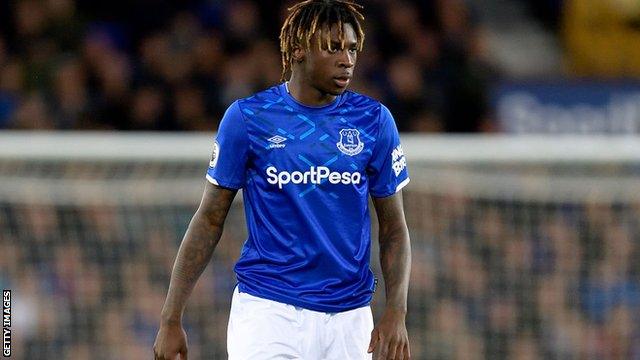
Highly rated teenager Moise Kean joined for £27m from Italian champions Juventus in the summer
Silva has been unlucky in a key area this season, with Andre Gomes cut down by serious injury against Tottenham and Fabian Delph - bought as a leader - often missing too.
The serious thigh injury to Jean-Philippe Gbamin, the giant Ivory Coast midfielder signed from Mainz for £25m in the summer, was also crucial.
He was earmarked as the replacement for the influential Idrissa Gueye, sold to Paris St-Germain, but managed only one league start before suffering an injury in training that required surgery and will keep him out until January.
And while Brands has rightly received great credit for landing the likes of France full-back Lucas Digne, Yerry Mina and Gomes from Barcelona, as well as the Kean coup, there are still large holes in Everton's team that have been left unattended.
The club appeared to be caught out by Chelsea's decision to keep Kurt Zouma, a success on loan at Goodison Park last season. All the eggs were in that basket and when no alternative was forthcoming, Silva was left a central defender light.
The long-standing goalscoring problem, an Achilles' heel since the departure of Romelu Lukaku to Manchester United in 2017, still exists.
Kean is a work in progress, while Dominic Calvert-Lewin is not a prolific marksman. Richarlison prefers the wider role and Cenk Tosun is one half of Allardyce's £50m leftover folly, along with Theo Walcott.
Brands was brought in with the brief to ensure transfer strategy was structured and gaps filled. In this respect Silva has been ill-served and could say, with justification, that he deserves some understanding and sympathy.
For all that, though, the buck stops with the manager and now he has paid the price.
